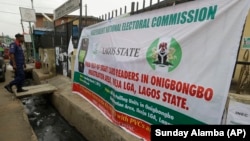Nigeria’s top election official promised Tuesday that this weekend’s national vote, which pits incumbent President Goodluck Jonathan against former military ruler Muhammadu Buhari, would be well organized, credible and peaceful.
The comments by Attahiru Jega, chairman of the Independent National Election Commission, come amid rising fears about whether Saturday's vote, which also includes both presidential and parliamentary races, will be marred by allegations of fraud or even violence, as in 2011.
Recent polls have shown Buhari and Jonathan in a tight race throughout much of campaigning.
Speaking to reporters in the capital Abuja, Jega said logistics have been an issue in the past, but the commission would start prepositioning polling materials Wednesday.
"Let me also reassure that INEC and all its field officials are determined to be impartial and nonpartisan in the conduct of these elections…" he said. "We will continue to do everything humanly possible to ensure a level playing field for all parties and candidates."
Critical to preventing fraud and identity theft is a new nationwide system using a new biometric voter register and something called permanent voter cards, or PVCs. The hope is that this new technology will make ballot stuffing and multiple voting impossible.
The new system has allowed the commission to remove more than 4 million duplicate registrations from voter rolls, Jega said.
He said 82 percent of voters have picked up their permanent voter cards. Electronic card readers at the polls will verify voters using the photo and fingerprint data embedded in each PVC's microchip.
Some political parties have objected to the use of the card readers, worried that hacking, theft or malfunction of the machines could keep people from voting.
INEC has held public demonstrations of the technology around the country. The commission said the only major issue has been difficulty reading some fingerprints, but Jega said this wouldn’t prevent a person from voting.
"If fingerprint scanning failed and yet a person is physically authenticated in the presence of party agents and all observers, an incident form report will be completed and the person would be accredited to vote," he said. "And this is consistent with an agreement that we had with the political parties."
Suleiman Abba, the country’s inspector general of police, said at least three security personnel will be at each of the approximately 120,000 polling places.
"Enough arrangements have been made for security at these polling units and arrangements have also been made enough for the materials…" he said. "We will do everything possible to protect the integrity of the results so that at the end of the day the results will be acceptable to all."
Abba also called for "restraint" from politicians and voters during and after the vote. Accusations of vote rigging in 2011 triggered violence in the north that killed some 800 people.
This year's vote originally was scheduled for February 14, but officials decided to postpone it until March 28, citing security concerns, particularly in the north, where the radical Islamist group Boko Haram has been waging a brutal insurgency for nearly six years.




